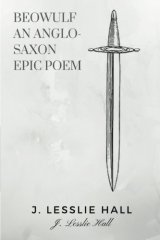Beowulf Page #11
Beowulf is an Old English epic poem consisting of 3,182 alliterative lines. It is one of the most important works of Old English literature. The date of composition is a matter of contention among scholars; the only certain dating pertains to the manuscript, which was produced between 975 and 1025.
[23] {She gives presents to the heroes.} 65 Treasure-cups tendered, till time was afforded That the decorous-mooded, diademed folk-queen {Then she offers the cup to Beowulf, thanking God that aid has come.} Might bear to Beowulf the bumper o'errunning; She greeted the Geat-prince, God she did thank, Most wise in her words, that her wish was accomplished, 70 That in any of earlmen she ever should look for Solace in sorrow. He accepted the beaker, Battle-bold warrior, at Wealhtheow's giving, {Beowulf states to the queen the object of his visit.} Then equipped for combat quoth he in measures, Beowulf spake, offspring of Ecgtheow: 75 "I purposed in spirit when I mounted the ocean, {I determined to do or die.} When I boarded my boat with a band of my liegemen, I would work to the fullest the will of your people Or in foe's-clutches fastened fall in the battle. Deeds I shall do of daring and prowess, 80 Or the last of my life-days live in this mead-hall." These words to the lady were welcome and pleasing, The boast of the Geatman; with gold trappings broidered Went the freeborn folk-queen her fond-lord to sit by. {Glee is high.} Then again as of yore was heard in the building 85 Courtly discussion, conquerors' shouting, Heroes were happy, till Healfdene's son would Go to his slumber to seek for refreshing; For the horrid hell-monster in the hall-building knew he A fight was determined,[2] since the light of the sun they 90 No longer could see, and lowering darkness O'er all had descended, and dark under heaven Shadowy shapes came shying around them. {Hrothgar retires, leaving Beowulf in charge of the hall.} The liegemen all rose then. One saluted the other, Hrothgar Beowulf, in rhythmical measures, 95 Wishing him well, and, the wassail-hall giving To his care and keeping, quoth he departing: [24] "Not to any one else have I ever entrusted, But thee and thee only, the hall of the Danemen, Since high I could heave my hand and my buckler. 100 Take thou in charge now the noblest of houses; Be mindful of honor, exhibiting prowess, Watch 'gainst the foeman! Thou shalt want no enjoyments, Survive thou safely adventure so glorious!" [1] The repetition of 'hwæðere' (574 and 578) is regarded by some scholars as a defect. B. suggests 'swá Þær' for the first: So there it befell me, etc. Another suggestion is to change the second 'hwæðere' into 'swá Þær': So there I escaped with my life, etc. [2] Kl. suggests a period after 'determined.' This would give the passage as follows: Since they no longer could see the light of the sun, and lowering darkness was down over all, dire under the heavens shadowy beings came going around them. XI. ALL SLEEP SAVE ONE. {Hrothgar retires.} Then Hrothgar departed, his earl-throng attending him, Folk-lord of Scyldings, forth from the building; The war-chieftain wished then Wealhtheow to look for, The queen for a bedmate. To keep away Grendel {God has provided a watch for the hall.} 5 The Glory of Kings had given a hall-watch, As men heard recounted: for the king of the Danemen He did special service, gave the giant a watcher: And the prince of the Geatmen implicitly trusted {Beowulf is self-confident} His warlike strength and the Wielder's protection. {He prepares for rest.} 10 His armor of iron off him he did then, His helmet from his head, to his henchman committed His chased-handled chain-sword, choicest of weapons, And bade him bide with his battle-equipments. The good one then uttered words of defiance, 15 Beowulf Geatman, ere his bed he upmounted: {Beowulf boasts of his ability to cope with Grendel.} "I hold me no meaner in matters of prowess, In warlike achievements, than Grendel does himself; Hence I seek not with sword-edge to sooth him to slumber, Of life to bereave him, though well I am able. {We will fight with nature's weapons only.} 20 No battle-skill[1] has he, that blows he should strike me, To shatter my shield, though sure he is mighty [25] In strife and destruction; but struggling by night we Shall do without edges, dare he to look for Weaponless warfare, and wise-mooded Father 25 The glory apportion, God ever-holy, {God may decide who shall conquer} On which hand soever to him seemeth proper." Then the brave-mooded hero bent to his slumber, The pillow received the cheek of the noble; {The Geatish warriors lie down.} And many a martial mere-thane attending 30 Sank to his slumber. Seemed it unlikely {They thought it very unlikely that they should ever see their homes again.} That ever thereafter any should hope to Be happy at home, hero-friends visit Or the lordly troop-castle where he lived from his childhood; They had heard how slaughter had snatched from the wine-hall, 35 Had recently ravished, of the race of the Scyldings {But God raised up a deliverer.} Too many by far. But the Lord to them granted The weaving of war-speed, to Wederish heroes Aid and comfort, that every opponent By one man's war-might they worsted and vanquished, {God rules the world.} 40 By the might of himself; the truth is established That God Almighty hath governed for ages Kindreds and nations. A night very lurid {Grendel comes to Heorot.} The trav'ler-at-twilight came tramping and striding. The warriors were sleeping who should watch the horned-building, {Only one warrior is awake.} 45 One only excepted. 'Mid earthmen 'twas 'stablished, Th' implacable foeman was powerless to hurl them To the land of shadows, if the Lord were unwilling; But serving as warder, in terror to foemen, He angrily bided the issue of battle.[2] [1] Gr. understood 'gódra' as meaning 'advantages in battle.' This rendering H.-So. rejects. The latter takes the passage as meaning that Grendel, though mighty and formidable, has no skill in the art of war. [2] B. in his masterly articles on Beowulf (P. and B. XII.) rejects the division usually made at this point, 'Þá.' (711), usually rendered 'then,' he translates 'when,' and connects its clause with the foregoing sentence. These changes he makes to reduce the number of 'cóm's' as principal verbs. (Cf. 703, 711, 721.) With all deference to this acute scholar, I must say that it seems to me that the poet is exhausting his resources to bring out clearly the supreme event on which the whole subsequent action turns. First, he (Grendel) came in the wan night; second, he came from the moor; third, he came to the hall. Time, place from which, place to which, are all given. [26] XII. GRENDEL AND BEOWULF. {Grendel comes from the fens.} 'Neath the cloudy cliffs came from the moor then Grendel going, God's anger bare he. The monster intended some one of earthmen In the hall-building grand to entrap and make way with: {He goes towards the joyous building.} 5 He went under welkin where well he knew of The wine-joyous building, brilliant with plating, Gold-hall of earthmen. Not the earliest occasion {This was not his first visit there.}
Translation
Translate and read this book in other languages:
Select another language:
- - Select -
- 简体中文 (Chinese - Simplified)
- 繁體中文 (Chinese - Traditional)
- Español (Spanish)
- Esperanto (Esperanto)
- 日本語 (Japanese)
- Português (Portuguese)
- Deutsch (German)
- العربية (Arabic)
- Français (French)
- Русский (Russian)
- ಕನ್ನಡ (Kannada)
- 한국어 (Korean)
- עברית (Hebrew)
- Gaeilge (Irish)
- Українська (Ukrainian)
- اردو (Urdu)
- Magyar (Hungarian)
- मानक हिन्दी (Hindi)
- Indonesia (Indonesian)
- Italiano (Italian)
- தமிழ் (Tamil)
- Türkçe (Turkish)
- తెలుగు (Telugu)
- ภาษาไทย (Thai)
- Tiếng Việt (Vietnamese)
- Čeština (Czech)
- Polski (Polish)
- Bahasa Indonesia (Indonesian)
- Românește (Romanian)
- Nederlands (Dutch)
- Ελληνικά (Greek)
- Latinum (Latin)
- Svenska (Swedish)
- Dansk (Danish)
- Suomi (Finnish)
- فارسی (Persian)
- ייִדיש (Yiddish)
- հայերեն (Armenian)
- Norsk (Norwegian)
- English (English)
Citation
Use the citation below to add this book to your bibliography:
Style:MLAChicagoAPA
"Beowulf Books." Literature.com. STANDS4 LLC, 2025. Web. 10 Mar. 2025. <https://www.literature.com/book/beowulf_945>.








Discuss this Beowulf book with the community:
Report Comment
We're doing our best to make sure our content is useful, accurate and safe.
If by any chance you spot an inappropriate comment while navigating through our website please use this form to let us know, and we'll take care of it shortly.
Attachment
You need to be logged in to favorite.
Log In